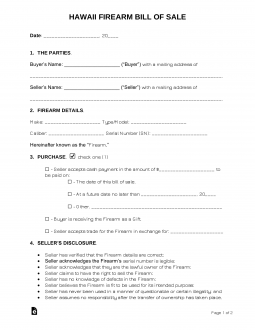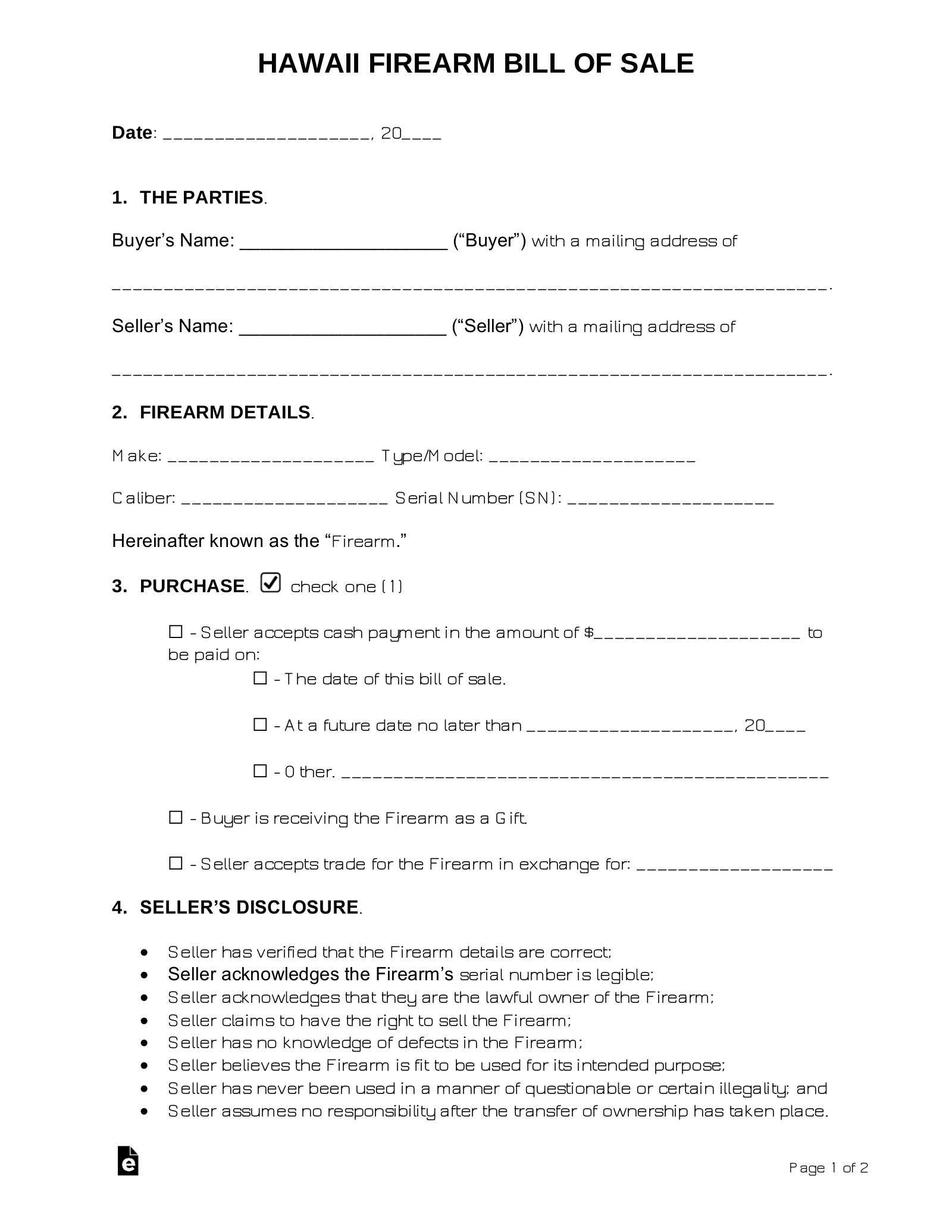Updated January 05, 2024
A Hawaii firearm bill of sale is a document that provides evidence of a legal sale, purchase, or trade of a firearm. It establishes a formal change of ownership and is required for the registration of the firearm. This form will require notarization and the signatures of two (2) witnesses.
Table of Contents |
Privately Selling a Firearm
Any private individual that is permitted to own a firearm in Hawaii is also permitted to execute the private sale of a firearm. The seller is required to sign the buyer’s Permit to Acquire.[1]
Prohibited from Buying
In accordance with Hawaii statutes,[2][3] none of the following individuals may own, possess, or control any firearm:
- (No transfer of any rifle having a barrel length of sixteen inches or over or any shotgun having a barrel length of eighteen inches or over, whether usable or unusable, serviceable or unserviceable, modern or antique, registered under prior law or by a prior owner, or unregistered shall be made to any person under the age of eighteen years.) [4]
- A person who is a fugitive from justice or prohibited from possessing a firearm or ammunition under federal law shall own, possess, or control any firearm or ammunition.
- Any person who would be prohibited under this provision from owning, possessing, or controlling a firearm and ammunition solely as a result of a conviction for a crime that is not a felony, and who is not prohibited from owning, possessing, or controlling a firearm or ammunition for any reason under any other provision of state or federal law, shall not be prohibited under this provision from owning, possessing, or controlling a firearm and ammunition if twenty years have elapsed from the date of the conviction.
- A person who is being prosecuted for one or more charges for a felony, a crime of violence, a criminal offense relating to firearms, or an illegal sale or distribution of any drug in a court in this State or elsewhere, or who has been convicted in this State or elsewhere of having committed a felony, or has been convicted in this State or elsewhere of having committed a felony, a crime of violence, a criminal offense relating to firearms, or an illegal sale or distribution of any drug shall own, possess, or control any firearm or ammunition; or
- Unless said person establishes, with appropriate medical documentation, that they are no longer adversely affected by the criteria or statuses identified under applicable Hawaii law, a person who:
- Is or has been under treatment or counseling for addiction to, abuse of, or dependence upon any dangerous, harmful, or detrimental drug, intoxicating compound,[5] or intoxicating liquor;
- Has been acquitted of a crime on the grounds of mental disease, disorder, or defect; or any similar provision under federal law, or the law of another state;[6]
- Is or has been diagnosed with or treated for a medical, behavioral, psychological, emotional, or mental condition or disorder that causes or is likely to cause impairment in judgment, perception, or impulse control to an extent that presents an unreasonable risk to public health, safety, or welfare if the person were in possession or control of a firearm; or
- Has been adjudged to:
- Meet the criteria for involuntary hospitalization; or
- Be an “incapacitated person,” as defined under the Hawaii law;
- No person who is less than twenty-five years old and has been adjudicated by the family court to have committed a felony, a crime of violence, a criminal offense relating to firearms, or an illegal sale or distribution of any drug shall own, possess or control any firearm or ammunition.
- Unless the minor establishes, with appropriate medical documentation, that they are no longer adversely affected by the addiction, mental disease, disorder, or defect, no minor shall own, possess, or control any firearm or ammunition if the minor:
- Is or has been under treatment for addiction to any dangerous, harmful, or detrimental drug, intoxicating compound, or intoxicating liquor;
- Is a fugitive from justice; or
- Has been determined not to have been responsible for a criminal act or has been committed to any institution on account of a mental disease, disorder, or defect.
- For the purposes of enforcing this section, or any other law to the contrary,[7] any agency within the State shall make its records relating to family court adjudications available to law enforcement officials.
- No person who has been restrained pursuant to an order of any court, including a gun violence protective order, from contacting, threatening, or physically abusing any person, shall possess, control, or transfer ownership of any firearm or ammunition, so long as the protective order, restraining order, or any extension is in effect. The protective order or restraining order shall specifically include a statement that possession, control, or transfer of ownership of a firearm or ammunition by the person named in the order is prohibited. The person shall relinquish possession and control of any firearm and ammunition owned by that person to the police department of the appropriate county for safekeeping for the duration of the order or extension thereof. At the time of service of a protective order or restraining order involving firearms and ammunition issued by any court, a police officer may take custody of any and all firearms and ammunition in plain sight, those discovered pursuant to a consensual search, and those firearms surrendered by the person restrained. If the person restrained is the registered owner of a firearm and knows the location of the firearm, but refuses to surrender the firearm or disclose the location of the firearm, the person restrained shall be guilty of a misdemeanor. In any case, when a police officer is unable to locate the firearms and ammunition either registered under this chapter or known to the person granted protection by the court, the police officer shall apply to the court for a search warrant for the limited purpose of seizing the firearm and ammunition.
- Any person disqualified from ownership, possession, control, or the right to transfer ownership of firearms and ammunition under this section shall surrender or dispose of all firearms and ammunition;[8]
Registering a Firearm
Firearm buyers and new residents in the state have five (5) days from purchasing or moving, respectively, to register their firearm(s) with the state.[9]
Concealed Carry
Concealed carry permits are available in the state, and the chief of police of a given county will grant licenses to individuals over the age of 21 and who meet the criteria and are not prohibited, as described above.[10] Applicants must submit the appropriate carry license application, in person, to the chief of police of their appropriate county.
How to Apply
Hawaii residents must be at least 21 years of age to apply for an open or concealed carry permit. The application process varies by county, but typically includes an application, some of proof of firearms competency, fingerprints, and a background check.
Reciprocity
Hawaii does not recognize concealed carry permits from any other states.


